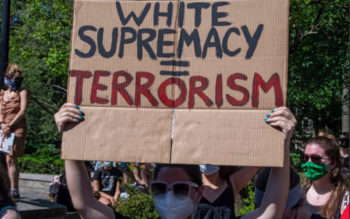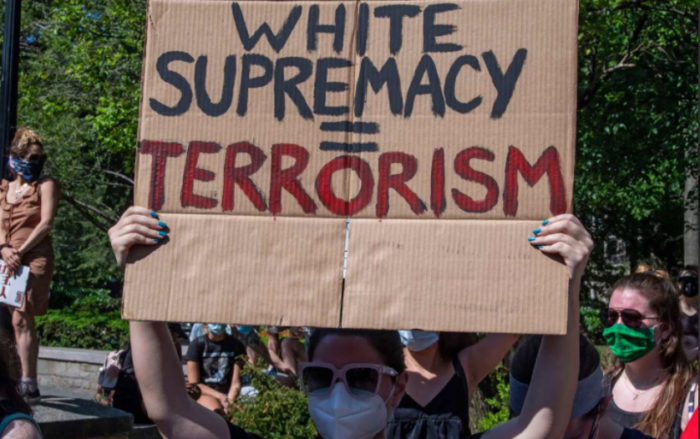Let’s Talk About Race and Racism. White Supremacy Versus “White Supremacy”
For several weeks now I’m been promising a post with the title of “The Rise of White Supremacy,” saying that will be the next post. But I’m not there yet. In fact, God knows if I will ever arrive at writing such a post–perhaps I will cover the issues involved in other ways, getting there piece by piece. But even though I won’t write the post I planned, I do want to talk about the words “White Supremacy.”
This series so far mostly is based on the history of the world leading into the history of the United States. But this post stems more from personal history–well, personal recent events. Though I will reference history.
NPR
I have been doing quite a lot of travelling recently–I’ll mention why later in this series, God willing–and as I travel, I like to listen to NPR. That’s “National Public Radio” for people reading this living outside the U.S.A.–it’s a bit like the BBC but less apolitical, more left-leaning (though NPR broadcasts a “BBC News Hour,” which I enjoy).
NPR has been talking quite a lot recently about race, racism, racial justice and so on. I’ve been listening, thinking, evaluating. “Are they saying something true or not?” is how my thinking goes. Sometimes I do the same sort of listening with Conservative talk radio. For whatever reason, I find this much more mentally engaging and interesting that listening to music–and when I drive, being mentally engaged helps fight off doziness.
Anyway, NPR has had on black artists talking about their perpectives on race, also Hispanics or Latinos (or “Latinx” is the term NPR uses quite often) talking about similar issues. And Asians talking about being Asian, economists talking about wealth disparities according to race, continual mention of COVID 19 outcomes being different according to race, and so on.
I listen and apply things I know to the conversations as part of evaluating the accuracy of what’s said. For example, let’s take on the issue of a higher percentage of black people getting sick with COVID. More black people live in cities than is typical for white people–and more use public transportation. There are historical reasons for that–a migration of black people away from the South in the mid-20th Century, seeking then-abundant manufacturing jobs in Northern cities, lead to black people living in cities at a higher frequency than white people. The public transportation systems in most U.S. cities were created in the 20th Century by generally left-leaning people who saw public transportation more enegy efficient (in 21st Century terms, as having a “lower carbon footprint,”) in addition to helping out disadvantaged people. So more black people, on average, ride busses or trains or subways to work or elsewhere than white people.
People living in crowded cities, traveling on crowded busses and subways, in close proximity to one another, are more likely to get sick. This must be a major aspect behind racial disparities in regard to COVID 19. It’s not the whole story–unequal healthcare coverage is there too as is the fact fewer black people in America’s cities work jobs where they can telecommute than white people living in the same cities. Note, I never heard any guest on NPR mention the role of public transportation, though they did mention healthcare and jobs. Perhaps someone did mention public transportation and I happened not to be listening at that moment, but I have heard many references to healthcare and types of jobs. Which is not wholly wrong, but is misleading.
So I often find shortcomings with NPR coverage. However, they are not totally wrong–sometimes they point out things I would not otherwise know anything about.
A Conversation About “White Supremacy”
Last night a male interviewer was talking with woman who offered strong opinions related to Critical Race Theory on NPR. It would have been so much more helpful to this post if I remembered her name, but I don’t. Besides, I am in general much more interested in what is being said than who is saying it. (I did a brief Intenet search for the interview and found a reference to Barbara Smith who wrote an article for The Nation, but I am not sure she was the person being interviewed last night.)

A protester holds up a sign during Black Lives Matter protests in New York City. (Ron Adar / Sipa via AP Images)
The woman was explaining why “systemic white supremacy” is a better term than “systemic racism.” She felt in effect that “systemic racism” doesn’t strike everyone as being as much of a serious issue than the term “systemic white superiority.” She also talked about the need for a sort of Marshall Plan to eliminate “white supremacy”–hundreds of billions of dollars of investment, if not even more than that, to combat the different outcomes that fall along racial lines (Barbara Smith wrote an article on this subject, for sure). A plan nobody would enact unless they really take this issue very seriously.
You may have noticed that I’m putting “white supremacy” in quotes every time I use it in reference to what the woman I heard speaking say. I’m not being sarcastic here. Sarcasm is very much unlike me–I’m Mr. Very Sincere. Not 100 percent of the time, but close.
The woman being interviewed wants to use a term for the purpose of getting an effect. The effect being to totally transform our society, which she reasons will not happen unless people take the issue with utter seriousness. Which will not happen unless we use sufficiently strong terminology. OK. I get what she’s saying. But there’s a problem with her reasoning.
Actual White Supremacy
In the list of people I referenced in last week’s article about Scientific Racism, you get to names like Georges Vacher de Lapouge, Madison Grant, and Lothrop Stoddard, who openly advocated things like keeping races separate, suppressing immigration, engaging in eugenics to weed out unfavorable characteristics (including racial-based eugenics), and whose writings inspired the Nazis to literally go out and slaughter those they deemed to be inferior.
Modern white supremacists have lost much of their power, but they still burn black churches, defile Jewish graves, long for a race war in which white people will triumph (in their imagination), and are a dangerous fringe movement. Yeah, not every white supremacist is a bomb-tossing lunatic. Some are more rational, calm, and deliberate…and are rationally, calmly, and deliberately planning for how white people will resume colonial control of the entire world and will suppress people of other races.
Historical white supremacy really did feed into some of the reasons why there are racial disparaties to this day. It’s what I had planned to talk about with the “Rise of White Supremacy” post. Segregation was a big deal and its effects are not over yet. Likewise lynching and other violence against black people. It was done systematically in the history of the United States. The U.S.A. has changed a lot, but not all the way. But even if it had totally changed, the effects of actual white supremacy from the past still linger in our society. But that is not the same as our society being a white supremacist nation now.
It is not the same to live in a society that has in some ways favored white people, sometimes deliberately, sometimes accidentally (as in the public transportation example I used) as it is to live in a white supremacist society. Because “white supremacy” means something and it isn’t what the woman I heard on NPR says it is. Ask someone who lived in Nazi Germany to explain, especially a Holcaust survivor–some are still alive today.
The Danger of Conflating Terms
I of course realize that surely the woman I heard interviewed must know that Nazi Germany is not like the U.S.A. in many important ways. Though perhaps she might indeed say we have the same illness the Nazis had, but only in a less virulent form.
But that’s not what I heard her say in the interview. In the interview, she said the term “white supremacy” was better becasue it would strike people as a more serious issue. Who knows, if confronted with my reaction to what she said, she might change her tune or explain more fully in a direction I didn’t grasp. But even if she did, I think she said something true for other people.
People are using “white supremacy” in our country today not because they believe we are exactly the same as true white supremacists like the Nazis–but because they want to achieve an effect of mobilizing people, rallying people to their cause.
Intellectually I have a problem with that related to word definitions. If we call the situation in the United States today–and other places in the world like the U.S.A.–a condition of “white supremacy,” what shall we call the people actually plotting to destroy all non-white races? Super-duper white supremacists? Actual, like, no-kidding white supremacists? The terminology gets problematic. But there’s worse.
The Danger of Overreach, D&D Hysteria as an Example
The most serious problem with semantic overreach is not that it leaves us devoid of terms to talk about real white supremacists. The real danger is while some people rally to the cause of fighting racism because of the term “white supremacy,” others are turned off by. They in effect become hardened against helping resolve the lingering effects of racism, more hardened than they otherwise would be. Through over-use of a phrase, many people poo poo the idea that there’s any problem to deal with at all.
It’s a bit like the Chic tract I read about Dungeons and Dragons years ago. It claimed every Dungeon Master was a Satanist. I had been a Dungeon Master myself, so I knew that was nonsense. Many other people saw the claim was nonsense, too. However, that doesn’t mean a game with references to magic, gods and goddesses, but no references to the God of the Bible might possibly have an effect of pointing a person in the direction of modern Paganism. But the effect would be subtle, not guaranteed, not direct. It’s an effect worth talking about and worth considering–worth countering even by particular Dungeon Masters I know who are Christians who do things like have quests who explore the Seven Deadly Sins (for example). It’s a situation that should neither be ignored, nor over-stated.
But by overreaching, almost everyone I know mocks the idea that D&D ever influenced anyone in the direction of modern Paganism. Yeah, there are still a few true believers, but the false information, the semantic overreach, effectively steered people away from seeing there’s any truth to any problem at all.
In fact, “every Dungeon Master is a Satanist” is more ridiculous than “the United States is a White Supremacist nation.” The U.S.A. in fact went through a phase that was strongly white supremacist, though of course not 100 percent.
Nonetheless, blanket declarations of “White Supremacy,” while convincing to some people, strike others as nonsense. So they “throw the baby out with the bathwater” and deny there’s any truth at all to systemic racism.
But I would say systemic racism is not fictional–it’s just subtle. Worth fighting, but not the only issue our society faces. Worth treating seriously, but it’s not wise to inflate it into something bigger than it is. Note, the biggest predictor of your income is not your race but your parent’s income and how they raised you–yes, whole generations are born into poverty in the United States and stay there, yes this often falls along racial lines. But it doesn’t always. Generational poverty among white people also exists. We should ask “why?”
Conclusion
To deal with real problems, we need to correctly identify what those problems are.
Overreach, claiming stuff many people will see as hokum–that runs the risk of strengthening the hand of actual white supremacists…which is why I’m against it. While at the same time, I’m against seeing racism broad enough to call “systemic” as hokum…
What are your thoughts?










































My thoughts are that you need to research further, particularly the term “structural violence” in regards to a disparity of power, opportunities and legal consequences in the US.
Stop whitewashing the problem away. You have the luxury of not experiencing the structural violence I’m referring to. And trust me, I did not realize the extent or severity of the problem until I adopted a son who isn’t white.
I’ve been waiting for a response to this one, since it’s at least as pointed/mean as the ones I have made. Maybe Travis will imply that he’s fallen off the turnip cart directly onto the bandwagon, like he does with me. Maybe Brennan will come around and question his grasp on reality. Will Autumn feel it necessary to play referee and reasonable third party between them?
But it’s been a couple-few days of RADIO SILENCE. Now how can that POSSIBLY BE? Ordinarily by this time there’s at least a dozen back-and-forth posts on these posts. I WONDER WHY IT BE LIKE THIS.
For my part, I’ve been even busier than normal. I’ve had in my mind a lot of things I could say to every person in this conversation, and sometimes I even think I WILL say something, but by the time I sit in front of the computer I don’t feel like it anymore. Like…stuff sounds good in my head, but when I go to type it just doesn’t come out right. I COULD just type something and keep nitpicking it until it comes out right, but I don’t have the time or energy to spend on making the perfect post right now.
I also question whether I even feel like putting myself out there during such a sensitive time. I care about people, but when they’re upset to the degree a lot of people are right now, they’re prone to misunderstanding and lashing out whether or not it makes sense or is fair. I’ve had way too much of that in my life already, even in terms of regular interpersonal issues. I don’t know how much I feel like opening myself up to that when it comes to a topic of this magnitude. Normally it wouldn’t bother me so much, but the TIMING of the issue makes it hard. It’s probably fine on this site since I try to be thoughtful with my posts, but I always struggle when I know I could come across wrong or cause others to think less of me.
I’m NOT saying that so people can pretend to think highly of me to make me feel better. And I’m NOT actually willing to bend all of my beliefs, identity, etc around everyone else’s opinion(though I still listen and take everyone’s opinion into consideration). I’ve actually greatly reduced how much I care about what others think of me. But there are still things I do and don’t want to happen and I have to take that into consideration when I talk.
There are some things I’d like to get off my chest, so maybe later on in this post series I’ll scrape some of my thoughts together for a general commentary on the issue. But we’ll see whether or not I feel like it or get around to it. Other than that…I may or may not poke my head in to make a few observations or whatever.
Because it’s all pretty reasonable. You keep eisegeting my thoughts = your caricature of annoying conservatives.
I see what Travis is saying, yet also thought it interesting that the article seems to gloss over white supremacy and equate it with super-duper racism. It’s stupid to call all racism white supremacy when it’s a black person hating white people and arguing for black supremacy (and yes, if you don’t want me questioning your grasp of reality, don’t try to say the distinction doesn’t matter like you did last week), but it does all relate back to white supremacy as the genesis to pretty much everything. Especially because the inequity in black communities is basically due to white supremacy. Before racist laws, black families were more knitted together than Caucasian. Now it’s flip-flopped. I’ve heard before what Leanna said below, and find it disturbing. Same thing with access to schooling, healthcare, food, etc.
“It’s stupid to call all racism white supremacy when it’s a black person hating white people and arguing for black supremacy”
You question my grip on reality, but then you go and make really weird statements like this when there are examples that actually exist in the real world in a meaningful capacity, like within the caste system of India or with the Han Chinese vs other ethnicities within the Chinese political playing field.
Black supremacy is a couple centuries away from even the possibility of existing. Most people who scare-monger about “Black supremacy” are privilege distressed at best and dogwhistle racists at worst, and no one should pay attention to them.
TL;DR it’s not that I disagree with your larger point, you just made it in the weirdest possible way.
Lol… k. It exists: https://en.wikipedia.org/wiki/Black_supremacy
The point was to illustrate obvious opposites.
I did say “in a meaningful capacity”
“Black supremacy is a couple centuries away from even the possibility of existing.”
I’ve been working a lot. Too much to post this week. That’s the cause of the radio silence.
Tony, “violence” is a word with actual meaning. Its meaning is not the same as “inequality.” What you are calling structural violence is mostly not violence-even when it IS violent, it’s clearer and more to the point to identify the actual problem than to make generalities so sweeping they lack meaning. Such as talking about bias in policing leading to actual violence at times rather than “structural violence” which alienates people because it’s horse manure in terms of clarity and accuracy.
Look, I think there are problems to fix and I want to help, but there’s no long-term good to be obtained from mislabeling issues.
And that isn’t “whitewashing.” It’s truth telling!
“structural violence is mostly not violence-even when it IS violent” – wait, what?
You sliced my sentence in the wrong place. To rephrase for better emphasis: “What is called ‘structural violence’ is mostly not violence. And even those times when it is violent…” etc.
Better?
Ah, ok. My brain misread that. Thanks!
Imma gripe more about your definitions again. This time about your definition of white supremacy. You seem to take white supremacy as some kind of super-duper version of run-of-the-mill racism, but I would argue that pretty much all racism in the US relates back to white supremacy. It’s kinda funny (read: suspicious) that you haven’t tried to strip “white supremacy” of it’s historical/cultural baggage and argue about simple, logical definitions when you’ve spent most of your time doing that for just “racism.” White supremacy doesn’t have to be violent, after all.
“White supremacy” is an abundantly clear term. It requires a belief in race, that is, is a subset of racism, and requires a person to be actively striving to advance the interests of white people to the detriment of other races.
The term relates to racial theorists I’ve discussed from the late 1800s and early 1900s. White supremacy had effects in Jim Crow laws, US conquests in the Spanish-American War, and a host of other things. Its highest expression was in the Nazi party, who set out to conquer the world on behalf of white people–their type of white.
Modern skinheads, KKK, and Aryan Nations types have aptly been called “White Supremacists” ever since WW2-though there are non-violent people who use other means to deliberately advance what they see as white interests, who also deserve to be called “White Supremacists.”
Only in academia was “white supremacy” used to describe general inequality until about 10 years ago or so.
So, your definition of white supremacy, which is roughly: “Structural inequality that favors white people” is new. Is this a good change in definition?
If we do use “White Supremacy” in that way, what shall we call Aryan Nations and the KKK? Ultra white supremacists?
It’s not me changing definitions here…and the questions I ask about changing definitions are legitimate.
I appreciate the article and the points you make here. I’m sure you’ll get some backlash (since this is a political topic today and wading into that arena is impossible without backlash); however, your core points ring true. Namely:
These are important points, not just for this topic but all areas of dissention.
I would agree people who benefit from White Supremacy are not necessarily bad…but being a beneficiary of past White Supremacy and being a White Supremacist are not the same thing. Being a White Supremacist I would say is a bad thing–even if non-violent. White Supremacy requires a person to believe in a system of races and that white people belong at the top of the system.
If you don’t believe that, you may be deficient in many ways–complict perhaps even. But you are not a white supremacist.
I don’t think it makes sense to take issue with them not mentioning public transit when there is a whole massive discussion on housing (redlining, white flight, etc) and how that impacts generational poverty and health outcomes. Even just discussing it in part would have taken over the discussion so I can understand why they would leave it out.
There are also very deep rooted unconscious and dangerous biases in healthcare, such that black women are at a much higher risk of dying in childbirth even when they have no underlying health issues, a good job and excellent family support (this is the area I am most aware of because I actively keep on top of maternity issues)
It isn’t enough to believe that all people are created equal when so many areas of society have systemic issues.
This isn’t disagreeing with your issues around semantics. I don’t care what term people use so long as they recognize that they need to be active in this. 🙂
One of the important reasons to bring up the public transportation example is because the development of public transportation as the main means to help people without means to transport themselves in cities does in fact disproportionately affect inner-city black people and other minorities in the same zone more than anyone else. But it was not done out of bias. It was in fact done from several flavors of high-minded idealism.
The “white flight” issue involves some actual bias but also involves issues not related to bias. Related to the paragraph I wrote above, part of the reason white people left is they more frequently had cars or could obtain cars, allowing them to move to the suburbs…even while the large cities felt it was important to invest in public transportation, which mostly did not serve suburbs well (well, in NYC it does, but outside of NYC and a few other exceptions, people get to and from and across suburbs by car). So the transportation plans of cities tended to reduce movement to and around the suburbs of anyone who didn’t own a car–often, black people.
I suspect the people talking about “systemic racism” or “systemic white supremacy” don’t want to bring up examples where policies of left-leaning folks contributed to current inequalities. Because probably they see that as mudding the waters–it’s more compelling to tell a simple story about how racism has had powerful long-term effects. However, that story isn’t entirely true. The truth is more complex–which doesn’t mean a just society shouldn’t work to repair the results of past and present bias…but much of the difference in results does not stem from bias directly.
For example, your example of black women having a much higher chance of dying in childbirth I would say strongly connects to the places they go to get medical treatment and to give birth. This relates most strongly to where they live, which has a connection to past racism in part, but mostly isn’t related to bias. (Note it would be more telling of bias if data shows white women in hospitals who treat mostly black women get better treatment or black women in hospitals who mostly treat white women get worse treatment. But I don’t think the data shows that–I think it shows differences by hospitals and other treatment centers if you also correct for income.)
So while part of what I am saying really /is/ semantic–in particular, if we call everything “white supremacy” what shall we call the activities of white supremacists?–not all is. The semantic issue is semi-important, because I think what we call things matters. But I accept terms can be used in different ways under different circumstances in general.
More important to these posts of mine is the idea of identifying the real source of problems so we can actually fix them. If we really are going to wisely build a better society, I’d say we cannot assume willy-nilly that all inequality along racial lines stems from bias. Not all does. Which doesn’t mean structural inequality should not be fixed…